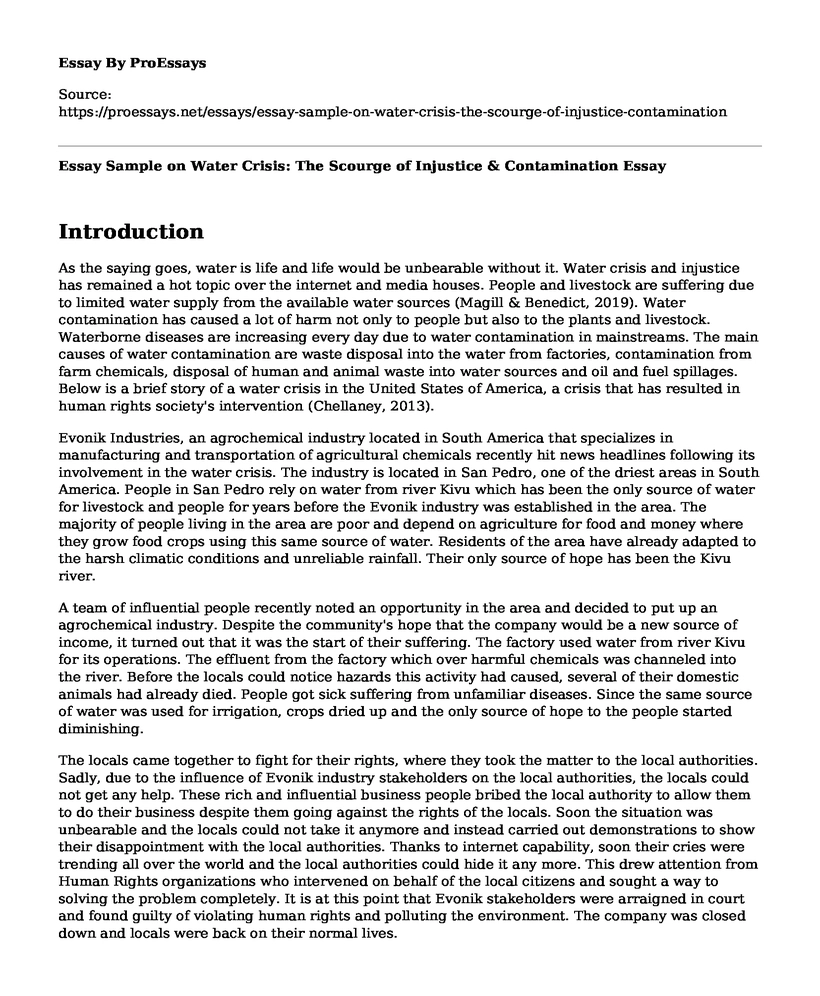Introduction
As the saying goes, water is life and life would be unbearable without it. Water crisis and injustice has remained a hot topic over the internet and media houses. People and livestock are suffering due to limited water supply from the available water sources (Magill & Benedict, 2019). Water contamination has caused a lot of harm not only to people but also to the plants and livestock. Waterborne diseases are increasing every day due to water contamination in mainstreams. The main causes of water contamination are waste disposal into the water from factories, contamination from farm chemicals, disposal of human and animal waste into water sources and oil and fuel spillages. Below is a brief story of a water crisis in the United States of America, a crisis that has resulted in human rights society's intervention (Chellaney, 2013).
Evonik Industries, an agrochemical industry located in South America that specializes in manufacturing and transportation of agricultural chemicals recently hit news headlines following its involvement in the water crisis. The industry is located in San Pedro, one of the driest areas in South America. People in San Pedro rely on water from river Kivu which has been the only source of water for livestock and people for years before the Evonik industry was established in the area. The majority of people living in the area are poor and depend on agriculture for food and money where they grow food crops using this same source of water. Residents of the area have already adapted to the harsh climatic conditions and unreliable rainfall. Their only source of hope has been the Kivu river.
A team of influential people recently noted an opportunity in the area and decided to put up an agrochemical industry. Despite the community's hope that the company would be a new source of income, it turned out that it was the start of their suffering. The factory used water from river Kivu for its operations. The effluent from the factory which over harmful chemicals was channeled into the river. Before the locals could notice hazards this activity had caused, several of their domestic animals had already died. People got sick suffering from unfamiliar diseases. Since the same source of water was used for irrigation, crops dried up and the only source of hope to the people started diminishing.
The locals came together to fight for their rights, where they took the matter to the local authorities. Sadly, due to the influence of Evonik industry stakeholders on the local authorities, the locals could not get any help. These rich and influential business people bribed the local authority to allow them to do their business despite them going against the rights of the locals. Soon the situation was unbearable and the locals could not take it anymore and instead carried out demonstrations to show their disappointment with the local authorities. Thanks to internet capability, soon their cries were trending all over the world and the local authorities could hide it any more. This drew attention from Human Rights organizations who intervened on behalf of the local citizens and sought a way to solving the problem completely. It is at this point that Evonik stakeholders were arraigned in court and found guilty of violating human rights and polluting the environment. The company was closed down and locals were back on their normal lives.
Conclusion
To conclude, water injustice has been prevalent over recent years due to the increasing demand for clean water (Magill & Benedict, 2019). Influential people have been observed to take advantage of the poor by undermining their rights to get clean water. At times, the people who are expected to protect the rights of the local citizens are manipulated by rich people (Forsythe, 2016). Business activities such as Evonik Industries have to be closed down for they put the lives of others at the risk of water contamination.
References
Chellaney, B. (2013). Water, Peace, and War: Confronting the Global Water Crisis. Rowman & Littlefield.
Forsythe, D. P. (2016). Encyclopedia of Human Rights: Vol. 1-.
Magill, G., & Benedict, J. (2019). Cascading Challenges in the Global Water Crisis. Cambridge Scholars Publishing.
Cite this page
Essay Sample on Water Crisis: The Scourge of Injustice & Contamination. (2023, Jan 31). Retrieved from https://proessays.net/essays/essay-sample-on-water-crisis-the-scourge-of-injustice-contamination
If you are the original author of this essay and no longer wish to have it published on the ProEssays website, please click below to request its removal:
- Plan Implementation and Neutralizing Opposition to Prevent the Crime Among the Juveniles Paper Example
- Bethany Kills Husband Thomas After 30 Years of Marriage: Criminal Case Analysis Essay
- The Debate of Marijuana Legalization: Examining its Effects
- Essay Sample on Supreme Court Power in National Policy-Making: Whittington & Dahl
- Race, Social Vices, & US Crime: A Philosophical Analysis Essay
- Essay on Border Security: An In-Depth Analysis of U.S. Immigration Issues
- Essay Sample on Social Security Act of 1935: A Federal Policy Change for the Elderly







